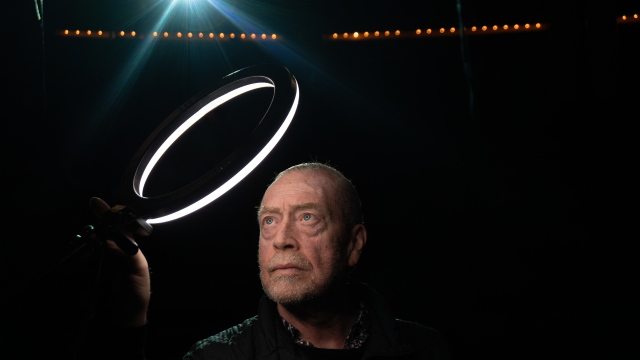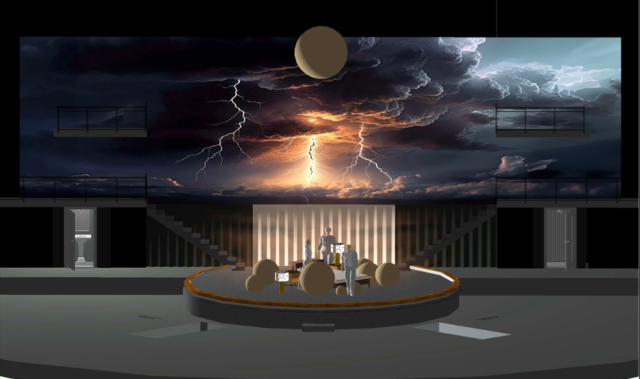
Peter Hinton-Davis, director of Das Rheingold, Edmonton Opera. Photo by Adanya Dunn.
By Liz Nicholls, 12thnight.ca
The dream is as epic as the world, and as small as … a ring.
Das Rheingold, the opening gambit in Richard Wagner’s monumental four-opera Ring Cycle, is the grand finale of Edmonton Opera’s 60th anniversary season. And it’s the first time the company has ever undertaken it, with plans to unroll the whole cycle opera by opera in subsequent seasons.
To help support 12thnight.ca YEG theatre coverage, click here.
In honour of the occasion, they’ve enlisted one of the country’s most distinguished theatre and opera directors, to bring it to the stage in a highly unconventional downsized “chamber version” we’ll see up close. That theatre thrust stage itself is an unusual destination for the company, the Citadel’s 685-seat Maclab house — instead of Edmonton Opera’s usual Size Large 2,500-seat home at the Jubilee Auditorium — starting Tuesday. And the forces in the adaptation by Jonathan Dove and Graham Vick which premiered at Birmingham Opera in 1990, are a dramatic re-think of size, too: 12 singers with an orchestra of 18 (instead of the usual 85).
The job of conductor Simon Rivard, says director Peter Hinton-Davis, “is everything that happens when (the cast) are singing; my job is everything that’s happening when they’re not singing.”
Wagner wrote his monumental Ring Cycle, a project of some 35 years in the creation, in reverse order with Das Rheingold, the opener, last, as Peter Hinton-Davis explains. What Wagner called “the preliminary evening” launches a wildly dramatic multi-generational story that begins with a shaft of sunlight on gold at the bottom of the Rhine River — and the fashioning of that Rhine gold into a magic ring that will give the possessor the power to rule the world, if (a gigantic caveat) they renounce love.
Das Rheingold plunges us into a outsized world of river nymphs, giants, dwarfs, gods and demi-gods, some of it co-opted from Norse mythology, some of it original. Jealousy, greed, the lust for power, treachery, betrayal … the curse of the ring: there is nothing meagre about the imaginative and emotional scale of Das Rheingold. “Big strokes!” declares Hinton-Davis, a playwright himself, whose startlingly broad resumé encompasses innovative contemporary versions of the classics and new Canadian work (including a major commitment to Indigenous theatre). “And yet, what is so crazy, it’s so precise, so accurate in the way people behave….” Unexpectedly, moment to moment, “there’s a precise psychological realism to it.”
The doom-laden entry of the gods into Valhalla at the end of Das Rheingold means eternal sanctuary, yes, but also their own death. As Hinton-Davis says, “they have knowledge of what they stand to gain at the end of the opera, and what they stand to lose…. What are the aspirations of the gods and what are the moral costs and consequences?” The quintessence of the cursed ring is the trade-off between power and love, the tension between the love of power, and the power of love. “All the characters lose hugely in this pursuit of power.”
It was that question, “big ideas, the costs of getting something achieved, the moral lines and ‘is it worth it?’” that drew him to Das Rheingold, says the Stratford-based Hinton-Davis, last in Edmonton to direct a stunning production this past season of Makram Ayache’s provocative epic The Hooves Belonged To The Deer. “It made me think so much about what we do as artists, the sacrifices, the price to be paid.”
Legend has it that The Ring came to Wagner, a multi-disciplinary artist if ever there was one, in a dream. And Hinton-Davis has been thinking, he says, of the dream of the founders of Edmonton Opera six decades ago. “What does it take to take to do something bigger than ourselves?”

Das Rheingold, stage rendering, designer: Andy Moro. Edmonton Opera. Photo by Adanya Dunn.
In Hinton-Davis’s conception, Wotan, the king of the gods, “is a conductor who has a dream of doing the Ring; he’s haunted by it.” His production takes place in a hotel room, “a messy dishevelled hotel room” where in the opening scene Wotan is sleeping in a bed surrounded by scores and take-out containers. “The opera itself is a dream of what he wants to create.” And Wotan has dreams within dreams.
The scope of the Ring, as is nothing less than a mythology, but the story does happens on the human, and even the domestic, plane, too — husbands and wives, lovers and daughters, the dwarf Alberich who steals the gold and instigates the whole multi-opera narrative. With Das Rheingold “I was trying to find a container for it that people could find relatable, rather than a hillside, or a mountain top, or an abstract location,” says Hinton-Davis. “The dream-like structures are inherent in the way the opera is built…. You’re invited into a world of dreams and dream images.”
The idea of a hotel room — “transient, nowhere and everywhere at the same time” — is an original, and radical, departure from the international archive of Ring Cycles that set about capturing the grandeur of the music in massive designs, like the groundbreaking technology created by Robert Lepage for the Metropolitan Opera in 2012, or the giant steel mills of the controversial Industrial Revolution Ring created by Patrice Chéreau for the Bayreuth Festival in the ‘70s.
The relationship between theatre and opera juggles aspects of scale, to be sure. “It’s the dream of many theatre actors to do aa show at the Citadel, the big house,” laughs Hinton-Davis. “For opera singers, the Maclab is intimate, chamber!” He hears “it’s so small” in wonder from his cast at every rehearsal.
The Maclab’s thrust stage, around which the audience wraps, “is a wild departure and experiment for opera,” which has traditionally made its home as an art form on huge proscenium (framed) stages, with a clear separation from the audience. For one thing, there’s no pit for the orchestra. “And the singers are so accustomed to watching the maestro down centre stage.” So attending to multiple directions, and playing diagonals, all part of stagecraft on a thrust stage, “are all very new to them.”
The spirit of the Birmingham reduction is accessibility. Dove and Vick “thought it a shame that Wagner was not available to so many opera companies” for budgetary reasons. A few characters are cut. “But we’re very accustomed to this in theatre…. It’s rare for someone do an uncut version of a Shakespeare play, for example,” as Hinton-Davis points out. “My goal is to make ‘chamber’ not mean small but ‘intimate’. So the audience gets close to it; it’s not overwhelmed by tons of scenery and pageantry…. It’s a rare opportunity to get into the heads of the characters.”
“People think of Wagner and they think of women with horns and breastplates. And very loud singing,” grins Hinton-Davis. Das Rheingold is “a more lyrical opera….” And the philosophical and psychological nuances are profound: “this is Wagner just before Freud and Nietzsche.”
Wagner himself was an innovator, musically, operatically, theatrically, dramatically; “he even devised theatres for his operas to be performed in,” as Hinton-Davis notes. He muses on the adoption of Wagner (who did have a personal dark side of anti-semitic views) in the 20th century as a poster artist by the Third Reich. “If anything, the Ring Cycle is such a cautionary tale about the abuses of power.” The goddess Erde appears with a repeat warning for Wotan against taking the ring and succumbing to the seduction of power. “‘Love is everything’,” she tells him. “So haunting, so wild, such an intimate moment…. What is the world we want to live in? What are its values? What are the costs of how we treat the environment? What will become of us?”
Hinton-Davis, whose own director’s archive includes many seasons at the Stratford and Shaw Festivals, as well as the artistic directorship of the National Arts Centre’s English theatre, will direct Shaw’s Major Barbara next season at the Shaw Festival. And he was intrigued to find that in the playwright’s 1905 preface, GBS pairs Wagner and Ibsen as theatre’s greatest innovators, “who changed the way we think about theatre.”
A companion surprise in synchronicity was completely inadvertent. On a break from total Wagner immersion, in his own Edmonton hotel room he stumbled on a random episode of the ’60s TV series, in which Kaye Ballard and Eve Arden, those kooky pop culture stars, are singing that catchy Ride of the Valkyries.
“The music is rarely decorative and never unmotivated,” Hinton-Davis has found in rehearsal. “And Wagner writes very human gods.”
Das Rheingold
Edmonton Opera, in partnership with the Citadel’s Heart and Hub Program
Adapted by: Jonathan Dove and Graham Vick
Directed by: Peter Hinton-Davis
Conducted by: Simon Rivard
Starring: Neil Craighead, Roger Honeywell, Dion Mazerolle, Catherine Daniel, Sydney Frodsham, Jim Yu, Vartan Gabrielian, Giles Tomkins, Jaclyn Grossman, Mariya Krywaniuk, Madison Montambault, Renee Fajardo
Where: Citadel Maclab Theatre
Running: Tuesday through June 1
Tickets: edmontonopera.com
